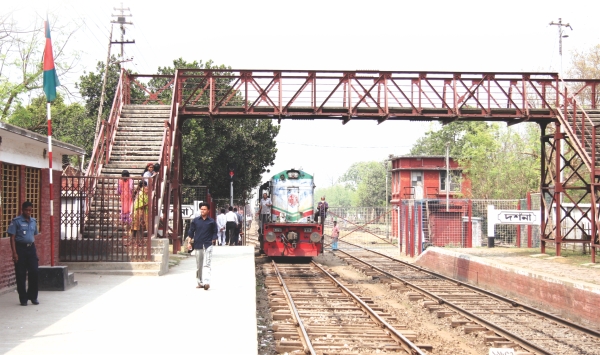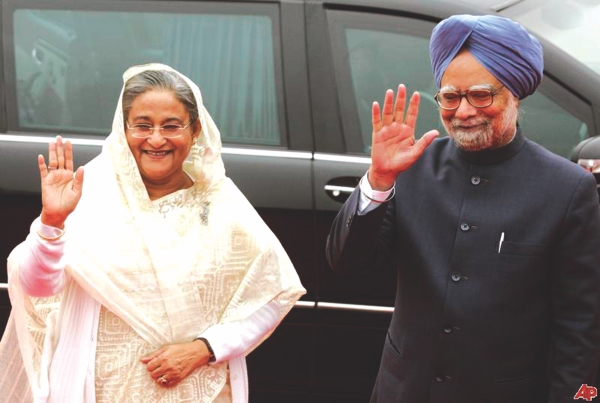
Inside
|
The Onus is on India to Deliver
Bangladesh has given a lot -- it is now India's turn, asserts BRIG GEN SHAHEDUL ANAM KHAN.
 Zahedul I Khan
Zahedul I Khan
For the first time in many years, Bangladesh is going to host an Indian prime minister. In fact it will be the first visit by an Indian head of government in over 12 years since Mr. Vajpayee travelled to Dhaka in June 1999 on the occasion of the inaugural bus service from Kolkata to Dhaka. This is a return visit, on a bilateral level, and one that is eagerly awaited… by the optimists for what it might achieve and by the pessimists for what it fails to deliver for Bangladesh.
Mr. Singh cannot be coming at a more interesting time. In the backdrop of his faux pas comment about the likely political denouement in Bangladesh, and some very misplaced observations regarding the extent of the hold of the religious parties on the Bangladesh electorate, and of the comments in the Economist that would want us to believe that India played not a very small role in the last general election that helped the Awami League (AL) achieve a huge majority, people in Bangladesh are waiting to see how the two countries chalk out plans to resolve the outstanding bilateral issues. And there is a concurrence of opinion across the board in both the countries that the onus is on India to deliver.
There has indeed been a quantum transformation in the state of Bangladesh-India relationship since the assumption of office by the AL-led grand alliance in 2009. It was quite a change from what was witnessed during the previous regime when the bilateral vibes were rather muted if not totally absent. Unfortunately, during that time, our relationship with our largest neighbour was largely weighed down by a mindset dictated by preconceived notions. And when heart dictates the head, there are all the chances of going wrong.
It is not easy for the AL to conduct business with India given the perception of its regional orientation as a political party. It was very important for the Awami League to have started off its second tenure in office by taking the opposition on board insofar as the diplomatic front is concerned, particularly in formulating its India policy and to dispel a perception held by its opponents of it being a “pro-India” party.
This has not been the case since there has not been enough public discourse on the issues concerned in the public fora, and with the BNP and its allies boycotting the parliament, there has been no discussion in the house either, although the AL should on its own have tabled all the issues related to Bangladesh-India, matters on the floor of the parliament.
The Indian PM's visit was preceded by high level trips to Bangladesh, two of which, one can presume, were to iron out differences on the outstanding sensitive issues. And one hopes those would be resolved through definitive courses of action. India cannot be oblivious to the fact that the ball is in its court, and that, “India's assurance of it being a reliable and genuine partner for mutual co operation and benefit be unambiguously conveyed by addressing many of Bangladesh's genuine concerns. India's commitment towards Bangladesh needs clear illustrations,” as one Indian scholar puts it.
The 12 January 2010 Bangladesh-India Joint Statement, signed during Sheikh Hasina's Delhi visit, can be summed up as a communiqué of three agreements and two MOUs. What we expect of the two Prime Ministers is take a stock of the progress in the implementation of the operative articles of the Statement, and in doing so provide specific directives to implement its provisions.
 PHOTO: AP
PHOTO: AP
By the time this article appears in print the two countries will, hopefully, have ironed out the details on the major outstanding issues particularly the sharing of the Teesta river waters, a matter the two countries have been seized with since after Sheikh Hasina's Delhi visit. In the list of important issues this happens to be for Bangladesh the most vital matter.
One would like to share the optimism of the two foreign ministers, expressed to the media during the Indian foreign minister's visit to Dhaka in early July, about signing of an interim agreement on water sharing of the Teesta and Feni, and a framework deal on land border during Indian Prime Minister's visit in September.
Reportedly, deals on transit, import of power from India, joint venture power generation, cooperation in security, education, culture, and trade liberalisation, etc., are on the cards.
One also understands from comments of the two advisors to the Bangladesh PM's, made after their return from the preparatory talks in Delhi in August, that the Teesta water sharing would be much more equitable than the Ganges water deal, and as for the land boundary issue, we have been assured of a better deal than the 1974 land boundary agreement. That is indeed encouraging but we have to wait till the agreements are inked to find out. However, any water sharing agreement without a guarantee clause would be meaningless for Bangladesh.
A very interesting feature of the current public discourse on Bangladesh-India relations, in India and Bangladesh, is the general agreement, in various circles in India, including the academia, journalists and civil society at large, that India has not reciprocated Bangladesh's moves in fulfilling its part of the Hasina-Manmohan Joint Statement. And these quarters have been equally vocal about the need for the Indian government to act fast on its commitments.
The need for fast action is also a matter that the Indian political and bureaucratic establishments are also seized with at the moment. There is indeed a degree of wariness in India that unless all that needs to be done to get all that needs to be got from Bangladesh, is done within the time left of the current government in Bangladesh, there are chances that those might not be possible to get should the AL not return to power in the next general election.
The BNP has made no secret of what it will do with some of the provisions of the January 2010 joint statement, if and when it comes to power. And its position on the transit issue has been rigid since the very time the idea was “re-floated” by India. And India understands only too well that Sheikh Hasina has put her political future in line, having, what even some Indians feel, given a bagful and got not even a pittance in return. There have been only talks so far on the Indian side, and if there are apprehensions in Bangladesh regarding India living up to its part of the bargain, history has to do a lot in shaping that psyche. For India there is always the legal process to blame for its failure to meet bilateral obligations, as had been done so long in the case of the Teen Bigha Corridor. For Sheikh Hasina nothing short of tangible outcome will allay the misapprehensions of her critics.
The one single issue with which public in Bangladesh is seized with currently is transit. Opinion is divided whether Bangladesh should accord the facility to India since we have no idea about the likely economic benefits from this. So far, we have no study to show the exact return from this venture.
It is interesting to note that the word connectivity is being used as a euphemism for transit, whereas in actual sense it is providing a corridor, something that was agreed by both the countries in 1972 while drawing up a trade agreement which addressed the issue of surface connectivity. The word transit appears to be more inclusive since it holds the prospect for regional and even wider surface linkages.
The issue of surface connectivity between the two countries had been an agreed matter since 1972. The Indo-Bangladesh Trade Agreement on March 28, 1972, (Article V of the Agreement)
provided for "mutually beneficial arrangements for the use of their waterways, railways and roadways for commerce between the two countries and for passage of goods between two places in one country through the territory of the other." While the 1972 agreement was for one year, a new trade agreement, which was signed on October 4 1980, had similar proviso for surface connectivity. Allowing Bangladesh transit to Nepal is not a new concession either, because while making his statement at the 1972 signing ceremony the Indian foreign trade minister's had said, “We, on our part, would be only too happy to provide the necessary transit facilities to Nepal and our friends in Bangladesh." And the agreement has been renewed from time to time by all the Bangladesh governments since.
The payments for use of Bangladesh transit facility has not been officially released yet neither are we privy to the number of points of ingress and egress to the Indian North East. It is understood that the charges have been worked out and awaiting India's input. And one would hope that the calculation has not been kept only to the economics of the issue. There is good deal of opportunity cost, both in terms of what the country will have to bear physically as also in terms of the loss in trade with the Indian NE as a consequence. Will we be remiss to ask India to share a part of the cost saved in reduced distance from its western part to its northeast? What is of actual concern though is whether the present condition of our infrastructure is good enough to take the expected transit loads? It may be a long time before transit can become fully operational.
The prickly issues related to the border need political goodwill on both sides to resolve. And there cannot be any more sensitive matter than the APL, which will involve ours parting with some and getting some amount of land from India and vice versa. The boundary demarcation has lingered on for much too long for the good of the two countries, and while there has been a degree of progress in the matter, like signing of border strip maps, one is not quite certain as to the progress made on the issues of adversely possessed land and the enclaves.
Tipai Dam is another issue, since mixed reports create apprehensions in the minds of the people in Bangladesh. Although verbal assurance has been given by none other than the Indian Prime Minister, one would be very interested in having a formal guarantee in this regard.
One should not lose sight of the fact that countries negotiate to uphold their national interest. By the same token, coexistence as good neighbours requires a good deal of give and take. Bangladesh has indeed given a lot, most of all in allaying India's security concerns it has taken brave steps. But what must prevail in the minds of our negotiators is the need to uphold our national interest in whatever agreements we enter with our neighbours.
And on a note of both optimism and caution, we welcome Mr. Manmohan Singh in our midst.
Brig Gen Shahedul Anam Khan ndc, psc (Retd) is Editor, Defence & Strategic Affairs, The Daily Star.